 |
 |
 |
 |
| |
||||
Prescription For DangerA CBS 2 News Special Assignment 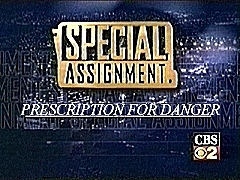 For the past nine years, Gallop polls of Americans have ranked pharmacists as the most trustworthy professionals in the country. For the past nine years, Gallop polls of Americans have ranked pharmacists as the most trustworthy professionals in the country. We have faith they will fill our prescriptions perfectly. But is it blind faith? CBS 2 News has learned some Southern California pharmacies are making deadly mistakes. CBS 2 News' Lonni Leavitt takes the blinders off and goes undercover to show us what might be a prescription for danger. Special Assignment: Prescription For Danger aired Thursday, November 5, 1998 "You're at their mercy," attorney Malena LeClair told CBS 2 News. "If they've made a mistake, you're just going to suffer the results." Those results can change lives forever, said CBS 2 News' Lonni Leavitt. It's a growing problem that will make you wonder if your pharmacy is safe. For Bryn Cabanillas, life looked hopeful. Bryn was born with cerebral palsy, but that never slowed her down. "She was very bright. She was ready to start kindergarten," Bryn's mother Jill Cabanillas told Leavitt. Bryn has just turned 6 years old when the pharmacist at Thrifty's Payless mistakenly gave her pills that were seven times the prescribed dosage, said Leavitt. That was four years ago. Today, the Cabanillas are living with the result of that pharmacy mistake. Bryn is now a child who suffers several seizures every day. She spends six hours a day in what is known as intensive, conductive therapy. Despite the therapy, she is unable to communicate with words or gestures. "I can see her little eyes and her face -- her expressions -- and I know," Bryn's father, Naldo Cabanillas, told Leavitt. "I have to think that one day she is going to talk and talk." Just how common are these pharmacy mistakes? And can what happened to the Cabanillas also happen to you? "We wanted to know how many times errors had occurred in this particular pharmacy," said Malena LeClair, the Cabanillas' lawyer. "The scary part is, they don't keep track of that information." "I think we have a crisis in pharmacies today," prescription drug expert Thomas Moore told Leavitt. "It's just like an accident waiting to happen," said another pharmacist, who wanted only to be identified as "George." "When you are pushed that much, you can break your concentration and people get the wrong medication." That's exactly what happened in the case of Miguel Cortes, reported Leavitt. Cortes is on two types of medications for severe asthma. A pharmacist made a mistake on the refills. "They had switched the labels around," Monica Cortes, his mother, told CBS 2 News. "If I had not given it to him before in the past, it would have been a lethal dose for him." Cortes said if she had followed the instructions on the label, it would have killed her son. "There are tremendous pressures on pharmacists to produce," Moore said. "I've seen pharmacists come out of pharmacies, their eyes glazed after filling 300 prescriptions that day. That's one a minute." Rite-Aid has a commercial currently running that touts its high-tech computer system that catches mistakes. "No one makes more safety checks than Rite-Aid," the commercial states, adding that its LifeCheck computer can catch mistakes immediately. So should we feel safe? Should we believe a computer will catch the mistakes made by an overworked pharmacist? "It just says there's an interaction between these two drugs, but it doesn't say what the interaction is or how serious?" asks George, referring to Rite-Aid's computer system. CBS 2 News went undercover to several chain pharmacies. An undercover producer told pharmacists she was checking on two prescriptions given to her father. Most of the pharmacists caught that the two drugs taken together could prove deadly, but one Rite-Aid pharmacist did not. "It's OK. One is an anti-histamine, one is anti-fungal. My first thought is they are both eliminated by the liver, but I think it's OK," the pharmacist said. In a statement, Rite-Aid told CBS 2 News if a real prescription had been presented, their computer would have caught it. And the chain said no pharmacist is capable of knowing all 75,000 possible drug interactions. That's why they have their computer system. "Put some more help in the pharmacies and avoid costly lawsuits, because they're going to get them as sure as God made little green apples," George added. The lawsuits have already started. Remember 10-year-old Bryn Cabanillas? A jury awarded the family over $30 million for the mistake made at the pharmacy, said Leavitt. There are some things you can do to protect yourself, said Leavitt. Make sure all your doctors and pharmacists know all the drugs -- including over-the-counter remedies -- that you are taking. Fill all your prescriptions at one place, and check them carefully. And, finally, avoid filling prescriptions on Monday, because it's usually the busiest day. More information:
|
|
 |
|

 |
||
|
12 p.m.
Woman 2 Woman One of the stars from "Judging Amy" 5 p.m. 6 p.m. 11 p.m.
|
||
 |
||
|
4-5 p.m.
Judge Judy Ruler Of The Free World! 8:00 p.m. 8:30 p.m.
9:00 p.m.
|
||
| |
||
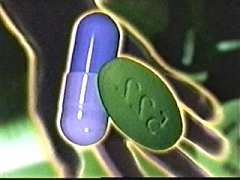 The magic of modern medicine: tiny pills that have both the power to heal and the power to ruin lives.
The magic of modern medicine: tiny pills that have both the power to heal and the power to ruin lives. 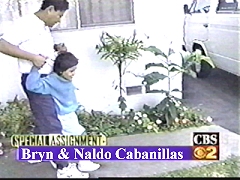 "They were not the 15 milligram, they were the 100 milligram tablets labeled 15 milligram," Cabanillas said.
"They were not the 15 milligram, they were the 100 milligram tablets labeled 15 milligram," Cabanillas said. 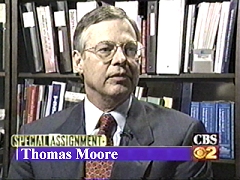 While no one keeps track of pharmacy errors, CBS 2 News found one national survey that shows more than half of pharmacists questioned admit to making at least one mistake in the past two months.
While no one keeps track of pharmacy errors, CBS 2 News found one national survey that shows more than half of pharmacists questioned admit to making at least one mistake in the past two months. 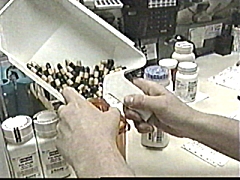 Pharmacies are cutting costs in a time when managed care and HMOs are cutting into profits, said Leavitt. Pharmacies that once had two or three pharmacists now have only one, with lower-paid technicians helping to carry the load. Twelve-hour shifts are the routine.
Pharmacies are cutting costs in a time when managed care and HMOs are cutting into profits, said Leavitt. Pharmacies that once had two or three pharmacists now have only one, with lower-paid technicians helping to carry the load. Twelve-hour shifts are the routine. 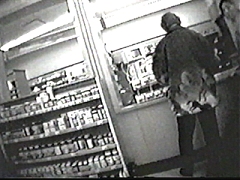 "That information we have to dig out for ourselves and, again, that takes time. (That) is what the pharmacist should be doing instead of making these phone calls or ringing the register or telling people where to get shoelaces or bobbypins," he said.
"That information we have to dig out for ourselves and, again, that takes time. (That) is what the pharmacist should be doing instead of making these phone calls or ringing the register or telling people where to get shoelaces or bobbypins," he said. 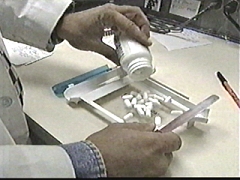 "We shouldn't feel safe," Moore told Leavitt.
"We shouldn't feel safe," Moore told Leavitt. 

